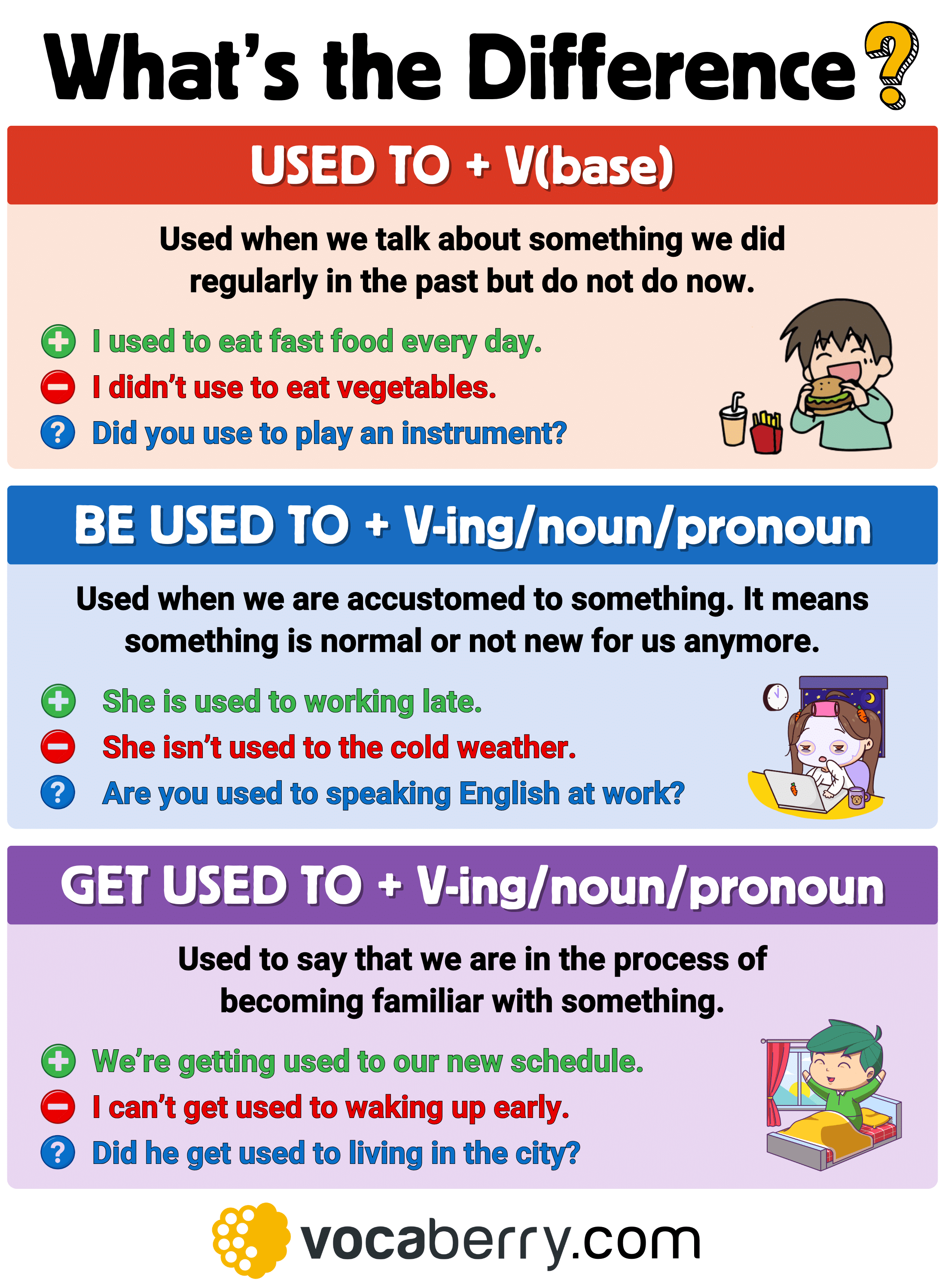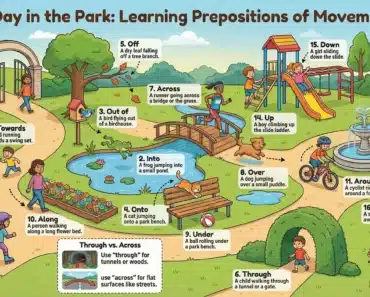
Many English learners get confused by the phrases “used to,” “be used to,” and “get used to.” They look similar, but they have different meanings, grammar rules, and uses in sentences. In this article, you’ll learn the difference between these expressions, how to use them correctly, how to form them in both positive and negative sentences, and when to choose the right one in daily conversation. We’ll also look at common mistakes, give you plenty of examples, and include a short quiz at the end so you can practice and check your understanding.
Used To – How to Talk About Past Habits in English
We use “used to” + base verb to talk about something that was true in the past but is not true now. It’s often used to describe past habits or situations that have changed.
Structure:
used to + base verb
Meaning:
Something you did regularly in the past, but not anymore.
Examples:
-
I used to play football every weekend. (But I don’t now.)
-
She used to live in London.
-
We used to go to the beach every summer.
-
He didn’t use to like vegetables.
-
Did you use to wear glasses?
Important: In questions and negatives, use “use to” (not used) because of the auxiliary verb did.
Be Used To – How to Say You’re Familiar with Something
“Be used to” means you are accustomed to something. It’s not new or strange for you. You can use it with nouns or gerunds (verb+ing).
Structure:
be (am/is/are/was/were) + used to + noun / verb-ing
Meaning:
You are familiar with it. It’s not difficult or unusual for you anymore.
Examples:
-
I am used to cold weather. (It doesn’t bother me.)
-
She is used to working at night.
-
They were used to the noise in the city.
-
Are you used to speaking in English?
It talks about your current or past comfort level with a situation or activity.
Get Used To – How to Talk About Adjusting to New Things
“Get used to” means you are in the process of becoming familiar with something. At first, it may be difficult or strange, but over time, it becomes easier.
Structure:
get (am getting / got / will get) + used to + noun / verb-ing
Meaning:
To become comfortable or familiar with something new.
Examples:
-
I am getting used to waking up early.
-
He got used to the new job after a few weeks.
-
You’ll get used to the noise.
-
Are they getting used to online classes?
Use this when something is new, and you are adjusting or adapting to it.
Used To vs. Be Used To vs. Get Used To – Summary Chart
| Phrase | Meaning | Structure | Example |
|---|---|---|---|
| Used to | Past habit or state (not true now) | used to + base verb | I used to play the piano. |
| Be used to | You’re familiar/okay with it | be + used to + noun/verb-ing | I am used to working late. |
| Get used to | Becoming familiar with something | get + used to + noun/verb-ing | I’m getting used to driving in traffic. |
Example Sentences with Used To, Be Used To, Get Used To
Used To – Past Habits or States
-
Positive: I used to eat fast food every day.
-
Negative: I didn’t use to eat vegetables.
-
Question: Did you use to play an instrument?
Be Used To – Being Comfortable or Familiar
-
Positive: She is used to working late.
-
Negative: She isn’t used to the cold weather.
-
Question: Are you used to speaking English at work?
Get Used To – Becoming Familiar Over Time
-
Positive: We’re getting used to our new schedule.
-
Negative: I can’t get used to waking up early.
-
Question: Did he get used to living in the city?
Common Mistakes with Used To, Be Used To, Get Used To
Here are some mistakes learners often make—and how to fix them:
Incorrect: I am used to eat late.
Correct: I am used to eating late. (Use verb+ing)
Incorrect: She used to going to school by bus.
Correct: She used to go to school by bus. (Use base verb after “used to”)
Incorrect: I get used to wake up early.
Correct: I get used to waking up early.
Incorrect: He didn’t used to like coffee.
Correct: He didn’t use to like coffee. (“Use” not “used” after “didn’t”)
Grammar Quiz: Used To, Be Used To, Get Used To
1. I ___ live in a small town, but now I live in a big city.
a) used to
b) be used to
c) get used to
2. She is ___ waking up early. It’s easy for her.
a) used to
b) used to go
c) get used to
3. They’re ___ the new rules at work.
a) being used to
b) getting used to
c) used to go
4. He ___ play guitar when he was younger.
a) used to
b) is used to
c) get used to
5. I’m not ___ the cold weather yet.
a) used to
b) getting used to
c) get used to
6. We ___ eating dinner late after moving to Spain.
a) used to
b) got used to
c) be used to
7. I ___ go jogging in the mornings, but now I don’t.
a) used to
b) am used to
c) get used to
8. He ___ the noise now, so it doesn’t bother him anymore.
a) is used to
b) used to
c) get used to
9. They ___ their new teacher. She’s very different from the last one.
a) used to
b) be used to
c) are getting used to
10. She ___ studying at night because she works during the day.
a) used to
b) is used to
c) use to
Quiz Answers
1) used to
2) used to
3) getting used to
4) used to
5) getting used to
6) got used to
7) used to
8) is used to
9) are getting used to
10) is used to






